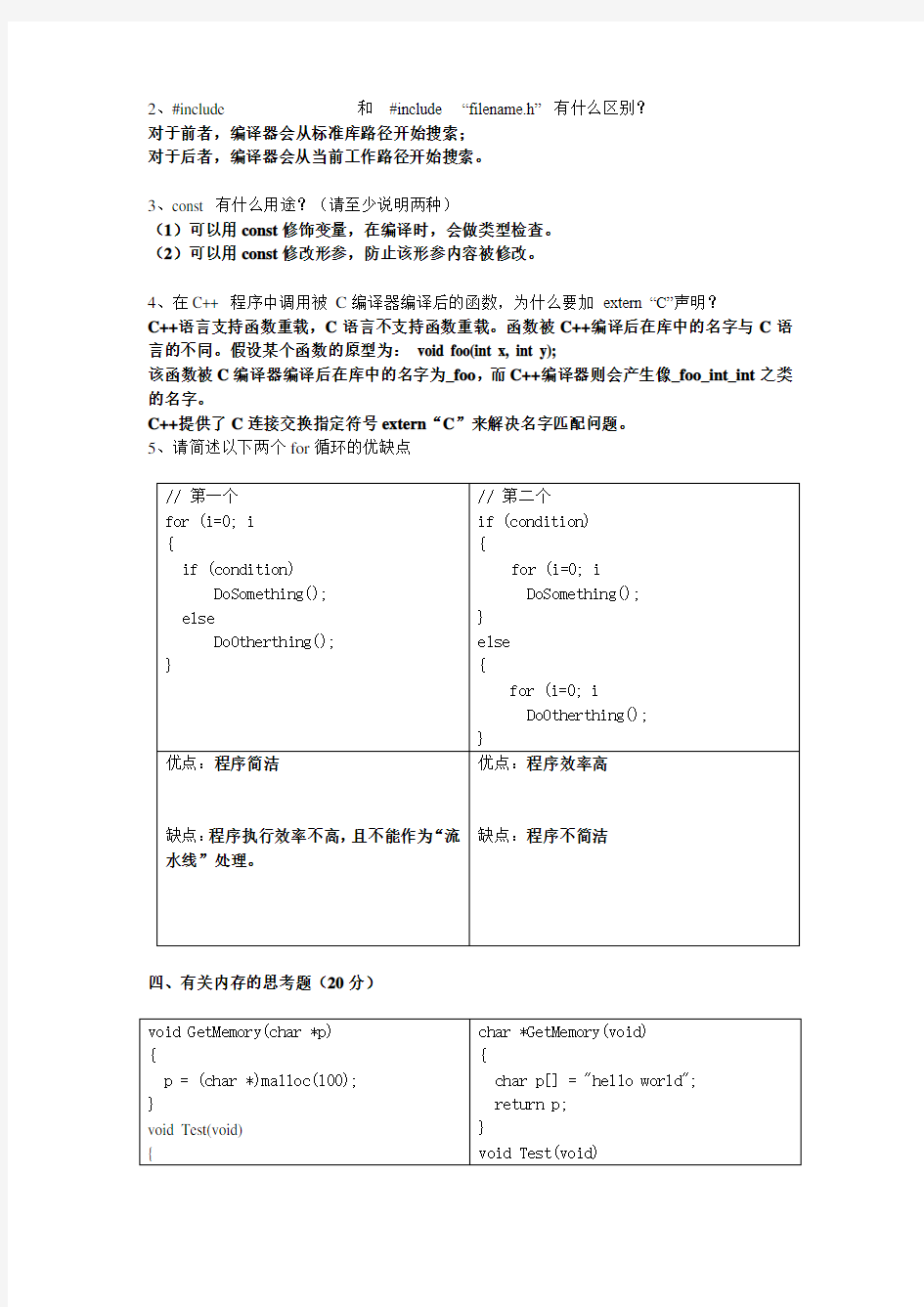基础C++笔试题


C++/C试题
本试题仅用于考查C++/C程序员的基本编程技能。内容限于C++/C常用语法,不涉及数据结构、算法以及深奥的语法。考试成绩能反映出考生的编程质量以及对C++/C的理解程度,但不能反映考生的智力和软件开发能力。
笔试时间90分钟。请考生认真答题,切勿轻视。
一、请填写BOOL , float, 指针变量与“零值”比较的if 语句。(10分)
提示:这里“零值”可以是0, 0.0 , FALSE或者“空指针”。例如int 变量n 与“零值”比较的if 语句为:
if ( n == 0 )
if ( n != 0 )
以此类推。
请写出BOOL flag 与“零值”比较的if 语句:
If (flag)
If (!flag)
请写出float x 与“零值”比较的if 语句:
Const float EXP = 0.000001;
If (x >= -EXP && x <= EXP)
请写出char *p 与“零值”比较的if 语句:
If (p == NULL)
If (p != NULL)
二、以下为Windows NT下的32位C++程序,请计算sizeof的值(10分)
char str[] = “Hello” ; char *p = str ;
int n = 10;
请计算
sizeof (str ) = 6
sizeof ( p ) = 4
sizeof ( n ) =4 void Func ( char str[100]) {
请计算
sizeof( str ) = 4 }
void *p = malloc( 100 ); 请计算
sizeof ( p ) =4
三、简答题(25分)
1、头文件中的ifndef/define/endif 干什么用?防止头文件被重复引用。
2、#include
对于前者,编译器会从标准库路径开始搜索;
对于后者,编译器会从当前工作路径开始搜索。
3、const 有什么用途?(请至少说明两种)
(1)可以用const修饰变量,在编译时,会做类型检查。
(2)可以用const修改形参,防止该形参内容被修改。
4、在C++ 程序中调用被C编译器编译后的函数,为什么要加extern “C”声明?
C++语言支持函数重载,C语言不支持函数重载。函数被C++编译后在库中的名字与C语言的不同。假设某个函数的原型为:void foo(int x, int y);
该函数被C编译器编译后在库中的名字为_foo,而C++编译器则会产生像_foo_int_int之类的名字。
C++提供了C连接交换指定符号extern“C”来解决名字匹配问题。
5、请简述以下两个for循环的优缺点
// 第一个
for (i=0; i if (condition) DoSomething(); else DoOtherthing(); } // 第二个 if (condition) { for (i=0; i } else { for (i=0; i 优点:程序简洁 缺点:程序执行效率不高,且不能作为“流水线”处理。优点:程序效率高缺点:程序不简洁 四、有关内存的思考题(20分) void GetMemory(char *p) { p = (char *)malloc(100); } void Test(void) { char *GetMemory(void) { char p[] = "hello world"; return p; } void Test(void) char *str = NULL; GetMemory(str); strcpy(str, "hello world"); printf(str); } 请问运行Test函数会有什么样的结果? 答: 导致运行程序崩溃。因为在函数中动态申请的内存,在函数返回时,就会被释放掉,所以调用GetMemory(str)后,str仍然为NULL, 当调用strcpy进行复制时,会发生程序崩溃。{ char *str = NULL; str = GetMemory(); printf(str); } 请问运行Test函数会有什么样的结果?答:可能会出现乱码。因为GetMemory函数中返回的P,是一个局部变量,在函数返回时,变会被释放掉,所以在执行到str=GetMemory();时,str将会变成一个“野指针”,指向的内容不可知,可以打印出来的是乱码。 Void GetMemory2(char **p, int num) { *p = (char *)malloc(num); } void Test(void) { char *str = NULL; GetMemory(&str, 100); strcpy(str, "hello"); printf(str); } 请问运行Test函数会有什么样的结果?答: 能够输出hello 但是会造成内存泄漏。void Test(void) { char *str = (char *) malloc(100); strcpy(str, “hello”); free(str); if(str != NULL) { strcpy(str, “world”); printf(str); } } 请问运行Test函数会有什么样的结果?答: 可能会造成程序崩溃。因为str被free后,成为一个“野指针”,指向的内容尚不可知,在执行复制时,修改动态存储区的内容,可能会造成严重的后果。 五、编写strcpy函数(10分) 已知strcpy函数的原型是 char *strcpy(char *strDest, const char *strSrc); 其中strDest是目的字符串,strSrc是源字符串。(1)不调用C++/C的字符串库函数,请编写函数strcpy char *strcpy(char *strDest, const char *strSrc) { Assert(strDest != NULL && strSrc != NULL); Char *ret = strDest; While ((*strDest++ = *strSrc++) != ‘\0’); Return ret; } (2)strcpy能把strSrc的内容复制到strDest,为什么还要char * 类型的返回值?为了实现连续赋值操作,如: Int strcpy(str1, strcpy(str2, str3)); 六、编写类String的构造函数、析构函数和赋值函数(25分) 已知类String的原型为: class String { public: String(const char *str = NULL); // 普通构造函数 String(const String &other); // 拷贝构造函数 ~ String(void); // 析构函数 String & operate =(const String &other); // 赋值函数 private: char *m_data; // 用于保存字符串}; 请编写String的上述4个函数。 String::String(const char *str) // 普通构造函数 { If (str == NULL) { M_data = new char[1]; If (m_data != NULL) *m_data = ‘\0’; } Else { Int len = strlen(str); m_data = new char[len+1]; If (m_data != NULL) { Strcpy(m_data, str); } } } String::String(const String &other) // 拷贝构造函数{ Int len = strlen(other.m_data); Delete [] m_data; M_data = new char[len+1]; If (m_data != NULL) Strcpy(m_data, other.m_data); } String::~ String() // 析构函数 { Delete [] m_data; // 或者写成 delete m_data; } String::String & operate =(const String &other) // 赋值函数{ If (this == &other) // 判断是否是自已 Return *this; Delete [] m_data; M_data = new char[strlen(other.m_data) + 1]; If (m_data != NULL) Strcpy(m_data, other.m_data); Return *this; // 返回调用者的引用。 }
